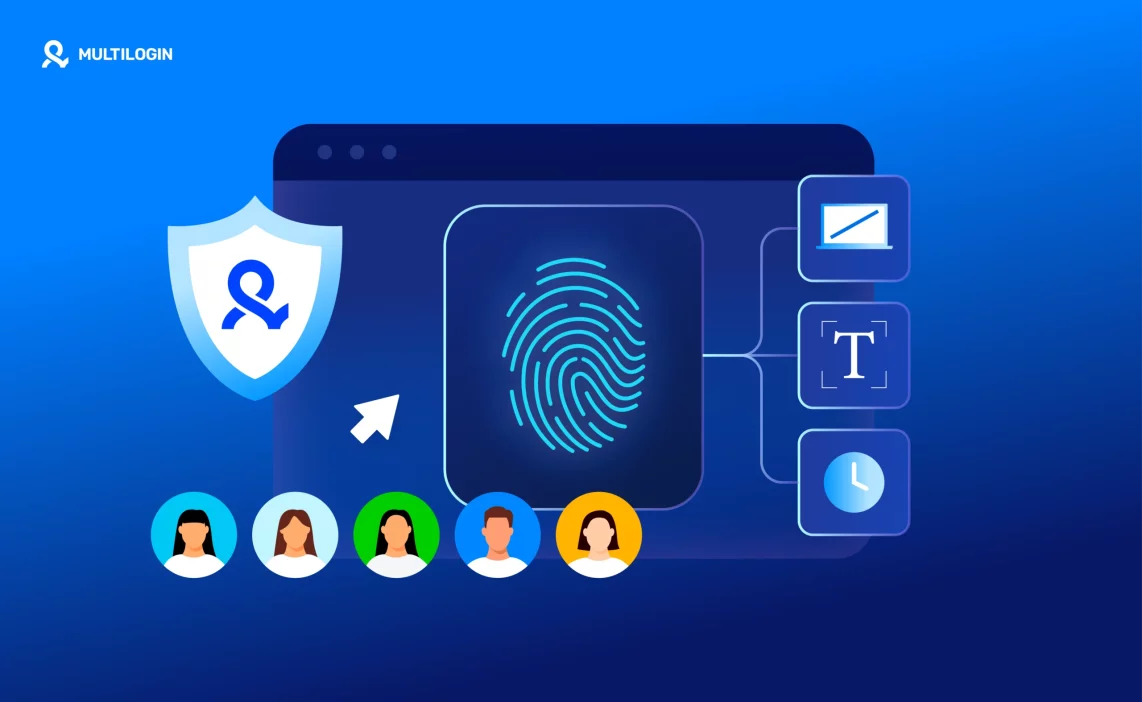Ever wonder how websites recognize you even without cookies or logging in? That’s browser fingerprinting — a system that tracks tiny details like your screen size, fonts, operating system, time zone, extensions, and even how your browser renders graphics. Together, these create a unique “fingerprint” that can link your activity across accounts and platforms.
You don’t need to accept cookies or share personal info for this to happen — your setup alone is enough. With Multilogin antidetect browser, you can manage multiple accounts safely by giving each profile its own unique fingerprint, isolated cookies, and dedicated proxies, so platforms see each account as a separate, independent user.
Why browser fingerprinting matters
Most people don’t notice it, but fingerprinting is everywhere. Platforms use it to stop fraud, prevent bots, and catch people running multiple accounts. For advertisers, e-commerce sellers, or data researchers, this means you can get flagged or banned even when you think you’re playing by the rules.
Read our guide on How to Prevent Browser Fingerprinting.
Why normal fixes don’t work
- VPNs or proxies only hide your IP. They don’t change the other data points that form your fingerprint.
- Incognito mode clears cookies, but your fingerprint stays the same.
- Switching devices or browsers works for a while, but it’s not scalable when you need to manage many accounts.
This is why so many accounts still get linked together, even when people use standard privacy tools.
How Multilogin solves fingerprinting issues
Most tools stop at hiding your IP, but fingerprinting goes much deeper. Multilogin builds a completely fresh environment for each account you run, covering every data point platforms use to track you.
Stop account links! try Multilogin now for €1.99!
Unique browser profiles
Every profile you create in Multilogin has its own digital fingerprint. This fingerprint is built from 25+ parameters such as fonts, time zone, screen size, and graphics rendering. To Facebook or any other platform, it looks like a real, independent browser setup. That means no two accounts you run will ever look the same.
Read our latest guide on Why Do Facebook Ad Accounts Get Banned.
Built-in proxies
Changing fingerprints without changing IPs is not enough — the two work together. With Multilogin, every plan includes residential proxy traffic. You can assign one proxy to one profile, which locks the IP to that account. This ensures there’s no overlap across accounts, one of the most common causes of bans.
Cookie and data isolation
Cookies, cache, and history are stored inside each profile. Nothing spills over. When you log in to multiple accounts, the sessions don’t share a single trace of data. To Facebook, TikTok, or any other site, each profile behaves like it has its own dedicated computer.
Learn more in our guide on How to Not Get Banned on TikTok.
Mobile and desktop emulation
Many platforms now look at whether you’re browsing from a desktop or a mobile device. Multilogin can emulate both. This means you can run an Android-like mobile profile or a standard desktop profile, depending on what your account needs. It keeps your activity consistent with real-world user behavior.
Team-ready collaboration
When you’re working with a team, sharing logins through spreadsheets or password tools creates leaks. Multilogin lets you share full profiles with teammates securely. Each person runs the profile exactly as you set it up, without exposing cookies or fingerprints. Role-based permissions give you full control over who can access what.
Get Started with Multilogin
Final verdict about what is browser fingerprinting
Browser fingerprinting quietly tracks every detail of your device and browser, linking accounts even when you think you’re isolated. VPNs, incognito mode, or clearing cookies aren’t enough — fingerprints reveal patterns that platforms use to flag or ban accounts. Multilogin solves this by giving each profile a unique fingerprint, isolated cookies, and a dedicated proxy. Whether you’re managing multiple social media accounts, running ads, or handling client projects, this approach keeps profiles separate, prevents automatic linking, and ensures your accounts remain fully independent.
👉 Try Multilogin for €1.99 and install your first Firefox extension in Stealthfox today.
FAQs
Multilogin stops your accounts from being linked through fingerprinting. Instead of using the same browser setup for every login, it creates unique browser profiles. Each profile comes with its own fingerprint — screen size, fonts, time zone, and dozens of other parameters — so every account looks like it belongs to a separate real user. This breaks the patterns that normally trigger bans.
Fingerprinting collects small details such as your device type, operating system, language, screen resolution, installed fonts, time zone, and graphics rendering. Put together, these form a unique ID. Multilogin protects you by customizing these values for each profile, making them look natural but different. To websites, every profile appears as its own independent device.
Yes. Incognito mode only clears cookies, and a VPN only changes your IP. Neither of them changes the fingerprint. That means you can still be tracked or linked. Multilogin is different because it generates a fresh fingerprint for each profile and locks a dedicated proxy to it. This way, both the IP and the fingerprint are unique, so accounts don’t connect.
Cookies are small files stored in your browser. They can be cleared or blocked, but your fingerprint stays the same. That’s why even after deleting cookies, websites can still recognize you. Multilogin handles both by isolating cookies inside each profile and giving every profile a unique fingerprint. Nothing leaks between accounts, so they remain fully separated.
You can’t stop websites from trying to fingerprint you. What you can do is control the data they see. Multilogin solves this by generating unique, human-like fingerprints that match normal browsing behavior. Each profile looks like a separate person online, so platforms can’t link your accounts through shared fingerprints.


